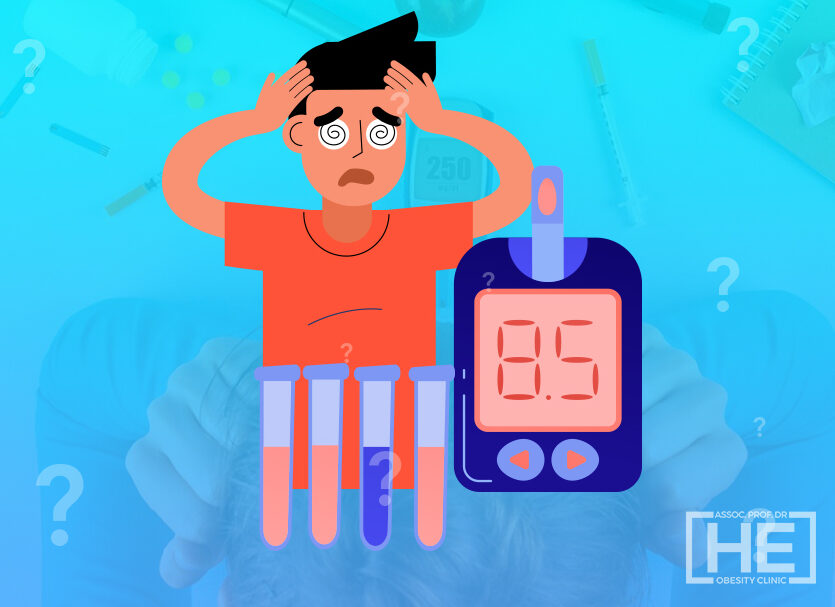
What is Diabetic Neuropathy, What Are Its Symptoms? Diabetic neuropathy, unlike normal diabetes, plays a leading role in the disease of anxiety disorders, nervous breakdowns, or psychological disorders.
However, the behavior that we often encounter in our daily lives, such as heated arguments, fights, impatient hasty behavior and intolerance, occurs due to neural diabetes. Because dietary diseases can cause nervous fluctuations, they can make people exhibit aggressive attitudes.
High sugar does not appear to be a condition that consists only of an increase in blood sugar in a person, we know that excess glucose in the blood destroys the body, especially vascular structures, my nervous system, eyes and kidneys.
In diabetes, it causes damage both through the vessels that feed the nervous system and directly by affecting nerve cells.
Research has shown that psychological factors such as mental distress, shock and fear affect the secretion of insulin in the pancreas, increase sugar in the blood, and have sugar in the urine. It has been revealed that mental problems invite diabetes.
In humans, conditions such as sadness, fear, distress, shock affect all glands, as well as have negative effects on the pancreatic gland. It has disruptive effects on the body’s nutritional balance and digestion.
When people are under stress, when they are afraid, the amount of sugar in the urine and blood increases. Mental disorders cause diabetes, while diabetes also causes a person’s mental state to deteriorate.
In this way, patients enter a vortex and depression occurs. A person who loses the pleasure of life begins to increase sugar over time. All of these are known as Diabetic Neuropathy symptoms.
What is Diabetic Neuropathy?
The most obvious feature of Diabetic neuropathy is that people give sudden and aggressive reactions. Rapid changes in blood sugar levels lead to sudden reactions. Because of the irregularity of blood sugar, a person’s thinking structure becomes prone to anger and can engage in behavior that he does not want.
After a while, a person becomes aware of this behavior and often experiences regret. Along with all this, diabetics are prone to being angry and angry if a person has an anxiety disorder or any mental imbalance. But this is not something that is in their hands.
Diabetic neuropathy is the occurrence of damage to the peripheral nervous system during the long-term course of Type I or type diabetes mellitus, and is one of its complications, such as diabetic retinopathy and diabetic nephropathy.
It may not give any symptoms in patients, as well as pain, numbness, needling in the hands and feet can cause symptoms. In advanced cases, muscle weakness, tissue eating disorders can cause skin color changes.
Diabetic neuropathy affects limbs such as arms and legs, as well as internal organs and systems such as intestines, urinary, sexual functions, and the heart. Diabetes is observed in more than 7% of society. 60-70% of diabetic patients develop diabetic neuropathy during their lifetime.
Although diabetic neuropathy can occur at any time after the onset of diabetes, it is more likely to occur with factors such as age, duration of disease, long stature, smoking, cholesterol and hypertension.
In patients whose diabetes duration exceeds 10 years, the risk of diabetic neuropathy is significantly increased. The presence of poor blood sugar control, obesity and hypertension further increases this risk.
What are Diabetic Neuropathy Symptoms?
Diabetic Neuropathy is the most common type of damage to the nervous system. Tingling in the feet, pain and numbness, increased burning at night, feeling of chills; Calluses occur in the feet.
Development of wounds in soft tissue. Conditions caused by diabetes in the hands are nerve jams, numbness in the first 3 fingers, burning sensation that spreads to the shoulders.
Symptoms of diabetic neuropathy vary depending on the affected nerves, severity of exposure, and duration of the disease. At the beginning of the disease, there are symptoms such as mild numbness, tingling, burning, chills in the hands, toes, while in advanced cases, symptoms such as severe pain, skin discoloration and muscle melting are added.
In more advanced cases, symptoms called diabetic autonomic neuropathy, which also affect internal organs such as the gastrointestinal tract, heart, begin to appear.
Heart attacks, called silent myocardial infarction with damage to Autonomic and pain nerve fibers of the heart, which the patient does not notice, are also one of the rare conditions that can be encountered during the course of diabetes.
In diabetic neuropathy, the peripheral nervous system can be affected in different ways. It is most often seen in the hands and feet holding the ends (distal), symmetrical, affecting both sensory and motor nerves. In addition, there can also be types that affect only one nerve and affect multiple single nerves.
It can also cause damage to the nerves of the head. Autonomic neuropathy is one of the most common types, which can lead to sudden low blood pressure (hypotension) or heart rhythm problems.
Can Obesity Cause Diabetic Neuropathy?
Low levels of vitamin B-12 can also cause neuropathy. Metformin, a common drug used to manage diabetes, can lower the level of vitamin B-12. You can ask your doctor for a simple blood test to determine any vitamin deficiency. A doctor will start by determining whether you have neuropathy, asking about your symptoms and medical history.
And you’ll have a physical. They control your sensitivity to temperature and touch, heart rate, blood pressure and muscle tone Nov. Your doctor can perform a filament test to test the sensitivity of your feet. For this, they will use a nylon fiber to check your limbs for any loss of sensation
Diabetic Neuropathy Treatment
In Diabetic Neuropathy, anger control and blood sugar balance should be treated simultaneously. From a mental point of view, the patient feels healthy and conscious is one of the most important stages of diabetes treatment.
It is recommended to receive psychological support to cope with anger attacks caused by anxiety and stress. In the Diabetic Neuropathy treatment, it is not right to try to balance rising blood sugar levels with insulin that you raise.
Here, the goal will be to apply a nutrition system that will not increase your blood sugar levels and use the necessary dose of insulin. Here, strict control of blood sugar (diet-medication and insulin therapy-exercise, etc.) is the most important element.
Due to loss of sensation, the feet become more open to trauma and damage. A lot of attention should be paid to foot care. After the appearance of the disease, treatments can be used to reduce pain and burning complaints, especially.
In nerve compression in the hands, there are different treatment methods. Especially at night, when lying down, the hand splints, movement restrictions are good for complaints.
What happens if diabetic neuropathy is not treated?
In untreated cases, it negatively affects the patient’s life. Especially at night, this can manifest itself in the form of absent-mindedness, headache, or a tendency to sleep during the day, as it negatively affects the sleep pattern.
Neuropathic pains do not heal with drugs from the classical group of painkillers. Normal painkillers are not used to treat neuropathic pain. Usually, there are some drugs that have been developed for epilepsy treatments for people with this type of pain, and these drugs are used only for neuropathic pain.
These epilepsy drugs are used for trigeminal neuralgia, cancer-related pain, phantom pain, neuropathic pain due to diabetes. Another group of painkillers used in neuropathic pain treatments, other than epilepsy drugs, are antidepressant drugs.




